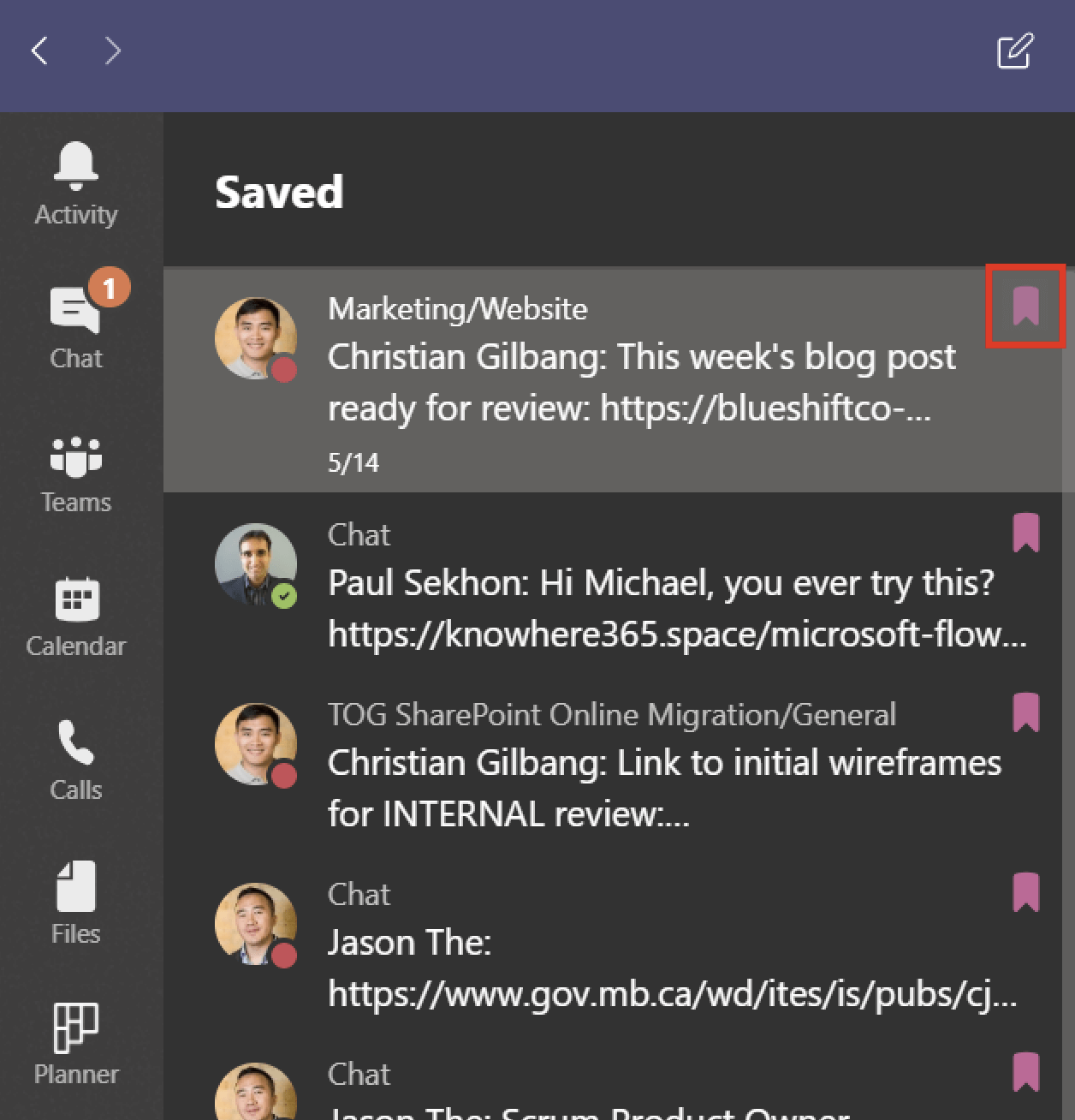Microsoft Teams has become an integral part of life for many of us, either because our organization was an early adopter of the product, or because we’ve been forced to find new ways to collaborate as much of the world learns to work from home. In either case, the old methods of company-wide reply all emails, CC-bombing, and endless email chains will hopefully die a quiet death, never to return.
Teams presents new challenges, and one of the most common I hear from the clients we work with is how they can sift through the “noise” in Teams to catch what they need to, and avoid the stuff that makes it hard to follow.
Notifications
By default, Teams is configured to send notifications for pretty much everything that happens. You can manage your notifications at the application level, the channel level, and right down to the individual conversation. We’ll break down how to change these, and what they each mean.
Application Level
In the desktop Teams app, click on your icon in the top right, and select Settings.
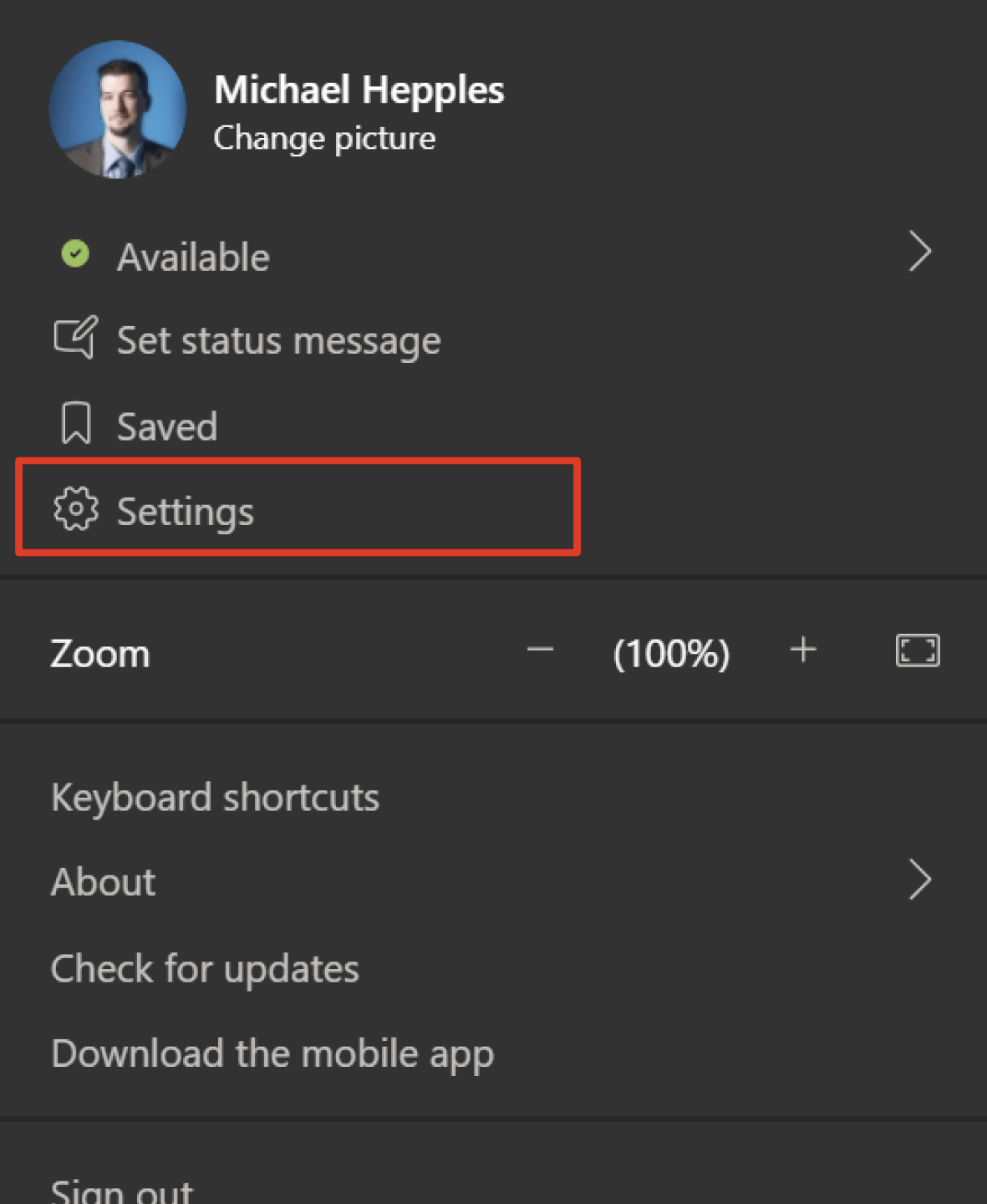
Choose Notifications on the left.


Mentions
Personal mentions
This setting determines how Teams handles notifications when you are mentioned specifically, anywhere in Teams.
- Banner and email – You will get a pop up notification, and depending on your email settings, and email after a period of time if you don’t view it.
- Banner – You will get a pop up notification.
- Only show in feed – You won’t receive a notification, but it will show as a new item in your Activity pane.
Channel mentions
This will determine how you’ll be notified (if at all) when a user mentions an entire channel in a Team you are part of.
- Banner and email - You will get a pop up notification, and depending on your email settings, and email after a period of time if you don’t view it.
- Banner - You will get a pop up notification.
- Only show in feed - You won’t receive a notification, but it will show as a new item in your Activity pane.
- Off – You won’t receive any notifications of @channel mentions.
Team mentions
This will define how notifications work when a user mentions a Team you are a member of.
- Banner and email - You will get a pop up notification, and depending on your email settings, and email after a period of time if you don’t view it.
- Banner - You will get a pop up notification.
- Only show in feed - You won’t receive a notification, but it will show as a new item in your Activity pane.
- Off – You won’t receive any notifications of @team mentions.
Messages
Chat messages
This handles the notifications for 1-1 and Group private chats.
- Banner and email - You will get a pop up notification, and depending on your email settings, and email after a period of time if you don’t view it.
- Banner - You will get a pop up notification.
- Off – This will mute all notifications for chat messages.
Replies to conversations I started
When you start a Teams conversation in a channel, this handles how you’ll be notified when other people reply to that conversation.
- Banner and email - You will get a pop up notification, and depending on your email settings, and email after a period of time if you don’t view it.
- Banner - You will get a pop up notification.
- Only show in feed - You won’t receive a notification, but it will show as a new item in your Activity pane.
- Off – You won’t receive any notifications of replies.
Replies to conversations I replied to
When you participate in a Teams conversation in a channel, this handles how you’ll be notified when other people reply to that conversation.
- Banner and email - You will get a pop up notification, and depending on your email settings, and email after a period of time if you don’t view it.
- Banner - You will get a pop up notification.
- Only show in feed - You won’t receive a notification, but it will show as a new item in your Activity pane.
- Off – You won’t receive any notifications of @team mentions
Likes and reactions
When users like or react to your posts, you can choose how Teams will notify you of that activity.
- Banner and email - You will get a pop up notification, and depending on your email settings, and email after a period of time if you don’t view it.
- Banner - You will get a pop up notification.
- Only show in feed - You won’t receive a notification, but it will show as a new item in your Activity pane.
- Off – You won’t receive any notifications of likes and reactions.
Followed channels
Teams will allow you follow specific channels, prioritizing them for specialized notification handling independent of the other channels in the team.
- Banner and email - You will get a pop up notification, and depending on your email settings, and email after a period of time if you don’t view it.
- Banner - You will get a pop up notification.
- Only show in feed - You won’t receive a notification, but it will show as a new item in your Activity pane.
- Off – You won’t receive any notifications of activity in the followed channel
Trending
Teams will highlight conversations that suddenly have a lot of activity over a period of time, and will provide you with notifications based on your preferences to let you know about these items.
- Banner and email - You will get a pop up notification, and depending on your email settings, and email after a period of time if you don’t view it.
- Banner - You will get a pop up notification.
- Only show in feed - You won’t receive a notification, but it will show as a new item in your Activity pane.
- Off – You won’t receive any notifications of trending items.
Other
Team membership changes
This handles how you are notified when users are added or removed to a Team you are a member of.
- Banner and email - You will get a pop up notification, and depending on your email settings, and email after a period of time if you don’t view it.
- Banner - You will get a pop up notification.
- Only show in feed - You won’t receive a notification, but it will show as a new item in your Activity pane.
- Off – You won’t receive any notifications of membership changes.
Team role changes
This allows you to choose how you are notified when a Member is promoted to the Owner of a Team, or vice versa.
- Banner and email - You will get a pop up notification, and depending on your email settings, and email after a period of time if you don’t view it.
- Banner - You will get a pop up notification.
- Only show in feed - You won’t receive a notification, but it will show as a new item in your Activity pane.
- Off – You won’t receive any notifications of role changes.
Notification sounds
If you have sounds turned on on your system, you can define whether or not Teams will play notification sounds.
- All – All notifications will play a notification sound.
- Call, mention and chat – Only notifications for calls, @mentions, and private chat will play a sound.
- Off – notification sounds will not play.
Missed activity emails
Teams allows you to receive an email escalation of activity you want to be notified of, in Outlook, based on your settings. This email will happen if you have not read that activity in a the designated period of time.
- As soon as possible – At the first opportunity, Teams will send you an email to let you know that there is activity in Teams that you are missing. This is best if you frequently close Teams.
- Once every 10 minutes – Teams will check every 10 minutes for new unread activity, and email you a summary.
- Once every hour - Teams will check every hour for new unread activity, and email you a summary.
- Once every 8 hours - Teams will check every 8 hours for new unread activity, and email you a summary.
- Daily - Teams will check every day for new unread activity, and email you a summary.
- Off – Teams will not send you any emails.
Highlights for you
Colleague joined Teams
Teams will send you a notification when a new coworker joins Teams (which you might see if your organization is migrating from another application to Teams, or doing a staged roll out of Teams.)
- Banner and email - You will get a pop up notification, and depending on your email settings, and email after a period of time if you don’t view it.
- Banner - You will get a pop up notification
- Only show in feed - You won’t receive a notification, but it will show as a new item in your Activity pane.
- Off – You won’t receive any notifications when a colleague joins Teams.
Meetings
Meeting started notification
This will define how Teams handles whether or not you’ll receive a notification when a meeting you are an attendee of starts. This is incredibly handy when you have a buy day, and might lose track of time while doing focused work.
- Banner – You will get a pop up notification when someone starts the meeting.
- Off - You won’t receive any notifications when a meeting starts.
Meeting chat notifications
You can decide how Teams handles notifications for activity in a meeting chat that you are invited to.
- Unmute – You will receive all notifications of chat messages, whether you are joined in the meeting or not.
- Mute until I join or send a message – The meeting chat will be muted until you join the meeting, or until you send a message to the meeting chat.
- Mute – You will not receive any notifications of chat conversations in any meetings.
Status
Follow a person's status and get notified when they appear Available or Offline. This allows you to follow a person, and receive a specific notification when their status changes.
Channel Level
You can set your notification preferences based on your needs for an individual channel. You should note that currently, the choice you make at the channel level will override what you have set at the application level, for that specific channel. This makes it possible to mute a particularly noisy channel while leaving it easily accessible, or prioritize the activity in a channel so that you always get alerted when new conversations get posted.
In the channel you want to manage, click the ellipse beside the channel name, and select Channel Notifications .
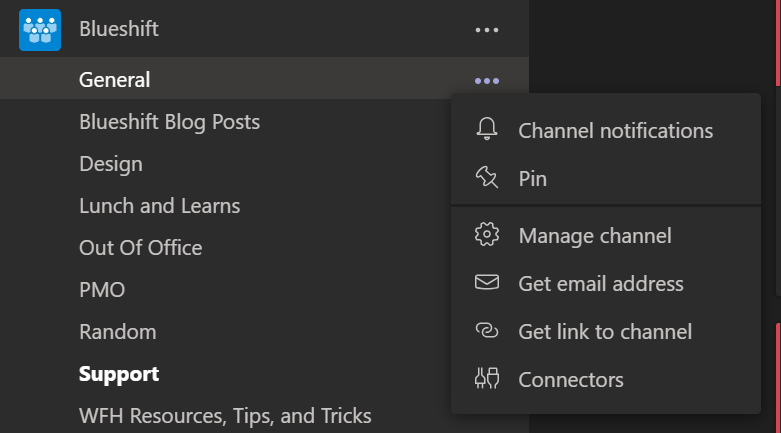
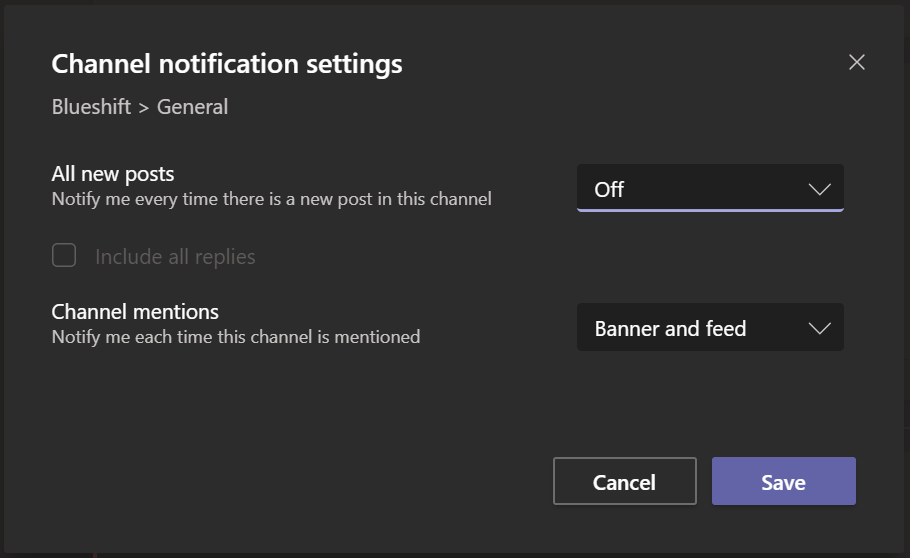
All new posts (Notify me every time there is a new post in this channel).
- Banner and feed- You will get a pop up notification, and the activity will show in your Activity pane.
- Only show in feed - You won’t receive a notification, but it will show as a new item in your Activity pane.
- Off – You won’t receive any notifications of new posts.
Channel mentions (Notify me each time this channel is mentioned).
- Banner and feed- You will get a pop up notification, and the activity will show in your Activity pane.
- Only show in feed - You won’t receive a notification, but it will show as a new item in your Activity pane.
- Off – You won’t receive any notifications of new mentions.
Conversation Level
You can also choose to turn notifications on or off for a specific conversation. Click the ellipse in the top right corner of a conversation, and you have the option to turn notifications on or off (depending on your channel or overall settings).
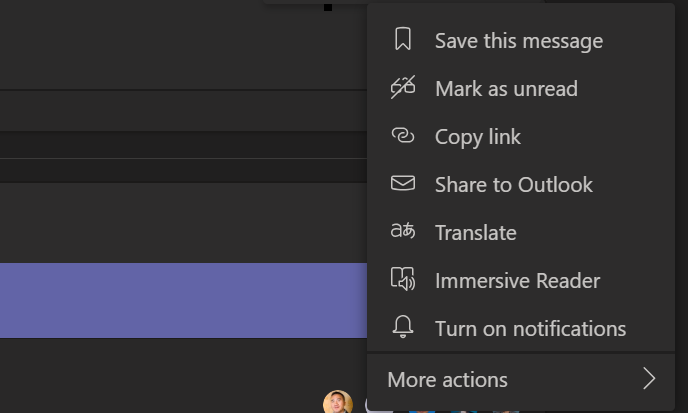
When you do so, you’ll get notified by a popup about how these notifications will be handled.
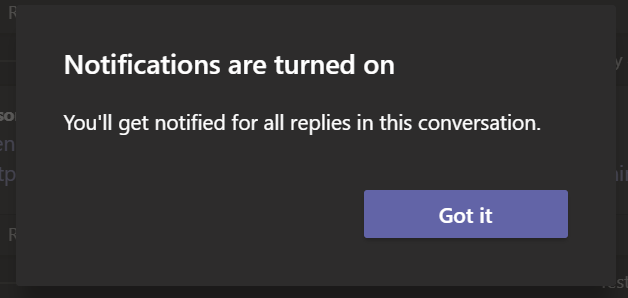
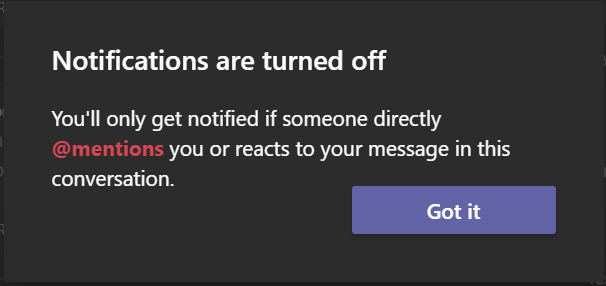
By handling individual conversations this way, you can spotlight a specific conversation thread in a channel to make sure you don’t miss any of the conversation (like when the doughnuts are getting delivered) or mute a thread that you have contributed to or started (like everyone thanking you for bringing doughnuts) so that the notifications don’t clog up your feed.
Do Not Disturb
Do Not Disturb is easily my favourite feature in Teams when it comes to controlling the chaos that can happen when the team is firing on all cylinders. Do Not Disturb mutes all notifications for Teams, including calls and messages, unless they are on your Priority Access list. This means you can continue to focus on the work you need to get done uninterrupted, with the security of knowing that if your boss needs to get in touch with you, they can continue to do so.
Setting Do Not Disturb can be done manually by clicking on your Profile, and setting your status to Do Not Disturb.
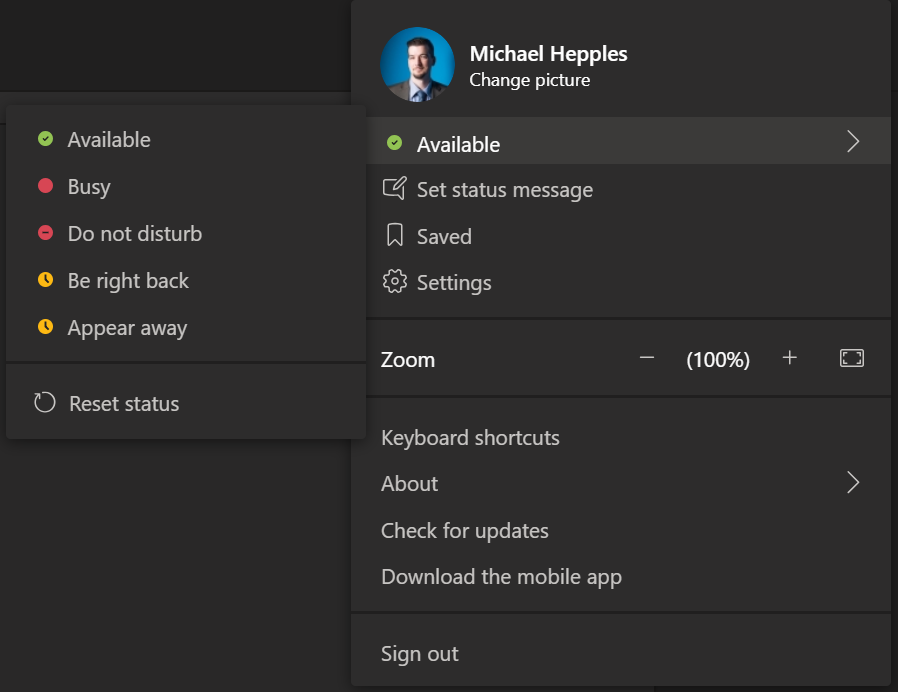
You can manage your Priority Access list by going into Settings, under Privacy go to Manage priority Access.

Here you can easily add someone by typing their name into the box, or remove them from Priority Access by clicking the X across from their name on the right.

Save for Later/Saved list
Now that you have fine-tuned your notifications to the point where you get notified of the stuff that is important to you, and the rest quietly waits for the moment when you have a cup of coffee in hand and a few minutes to browse, there is one final tip that will help you tame Teams. I’m a huge fan of the Flag for Followup feature in Outlook, as it lets me quickly triage an email, flag it, and find it quickly later, when I have a chance to properly read and respond to it. The speed that Teams can run at can make it very tempting to act immediately when something comes in, for fear that by the time you get the time to address it, it will take you forever just to find it again. This will, of course, absolutely murder your productivity, and where’s the value in that?
You may not already know this, but every message you get sent in Teams, whether it is in a chat or channel, has an option to Save this message.

What this will let you do is quickly mark a message as saved in a couple of clicks, creating your very own flagged for followup list in Teams.
You can access this list quickly by typing "/saved" in the command bar at the top of the application, and hitting enter.

Here’s a neatly curated list of everything that you have saved!
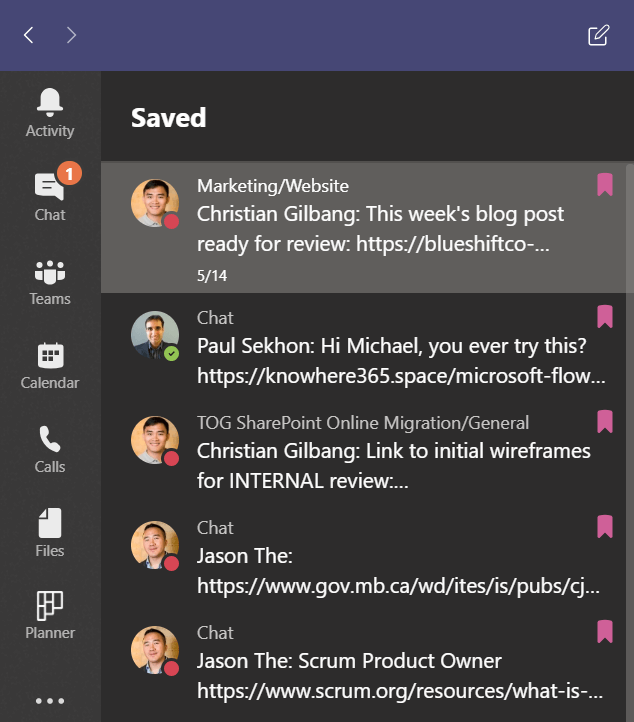
Clicking on an item in the list will take you to the message in Teams so that you easily return to the conversation exactly where you need to be, so you can address it when you have time to do so properly without searching. You can also quickly clear an item off of this list by clicking on the bookmark icon next to it. I use this feature constantly to keep track of important information that has been shared with me, and items I need to come back to later. It has become an integral part of my daily planning and time/task management flow.
